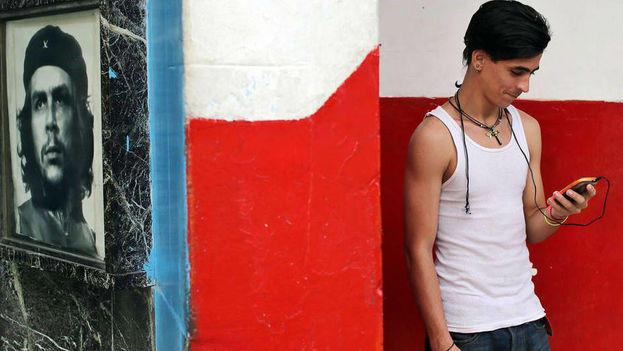
![]() 14ymedio, Generation Y, Yoani Sanchez, Havana, 15 August 2018 — A young woman was talking on the phone in a café when someone at the next table overheard the conversation. In a few minutes everyone in the place had their eyes glued to their cellphones to test the mobile internet they’d heard about in that private dialogue. The Telecommunications Company of Cuba (Etecsa) did not say a word, but at 11 am on Tuesday morning thousands of customers across the country knew that it was the moment they had been waiting for, for years.
14ymedio, Generation Y, Yoani Sanchez, Havana, 15 August 2018 — A young woman was talking on the phone in a café when someone at the next table overheard the conversation. In a few minutes everyone in the place had their eyes glued to their cellphones to test the mobile internet they’d heard about in that private dialogue. The Telecommunications Company of Cuba (Etecsa) did not say a word, but at 11 am on Tuesday morning thousands of customers across the country knew that it was the moment they had been waiting for, for years.
Neither the official website of Etecsa, the state communications monopoly, nor its public communication office revealed that tests were being undertaken of the web connection; it was only uncovered by independent journalism sites and private accounts on the social networks. Thus, after two decades of delay and surrounded by institutional secrecy, Cubans peered into the World Wide Web from their cell phones. The experience was exciting but the technical problems generated more frustration than hope.
Congestion preventing the opening of web pages, continuous crashes causing the loss of data signals to phones, and an inability to see the images in applications with multimedia content were some of the most common difficulties suffered by thirsty netizens who expected to set sail in the virtual world, but were barely able splash on the shore of the WWW.
“I’ve spent 20 minutes and I have not been able to open a single digital site,” complained a boy who had learned about the “pilot test” through a friend who works at Etecsa. “They told the employees not to say anything but everyone who has a friend spread the word,” he says. By the end of the day, he had managed to “enter Facebook Messenger and write a couple of messages,” in addition to reading “half of an article, because it wouldn’t completely load,” from a newspaper in Florida.
The disappointed young man was only nine when, in February 2011, the Alba-1 submarine cable connected Cuba with Venezuela. At that time the majority of Etecsa users thought that the Internet was around the corner, but mismanagement and the ruling party’s fear that citizens would actively launch themselves on the web delayed connectivity.
After that came a long period of concealment and evasions. Official voices insisted that the government was going to opt for the “social use” of the new technologies, but it maintained prices for web browsing that had no relationship to national salaries. Wi-Fi zones were also born, a last attempt to delay the arrival of the web in the private space, but at least this addressed millions of people’s the appetite for communication and need for contact.
Connectivity policy has focused on delaying the moment when customers are alone, in the privacy of their homes or in a remote spot far from the public wireless access areas, in front of a screen where they can interact and through which they can publish and be heard. But Etecsa’s arguments were running out, its customers ceased to be convinced by old excuse of the US embargo and the demands for internet on mobile phones became a clamor.
In the end, the clumsy state company — one of the least efficient in the world — has announced that before the end of the year it will enable access to the web from prepaid mobile phones. Postpaid users and some privileged officials or official journalists have been enjoying this opportunity for months, but their opinions on the quality of navigation are very negative.
“It’s hopelessly slow,” says a young journalism graduate who works at a local media outlet with a quota of mobile phones connected to the web. “They have asked us to defend the Revolution on social networks but at this speed it is very difficult,” he says. The basic use this information professional has made of the connection is limited to “exchanging messages by WhatsApp and trying two frustrated video conferences in IMO.”
After yesterday’s experience, spoiled by slowness and technical problems, customers now wait for Etecsa to make an open announcement on the implementation schedule for the service and on the rates for data packages. They also want guarantees of functionality since “for something so bad I’m not going to pay as if it were really internet access,” a woman in the Etecsa office stressed this Tuesday .
The state communications monopoly is in trouble. It has millions of customers tired of waiting and many of them, on August 14, peeked into the network through their phones. Now they want to repeat the experience more efficiently and with complete freedom.
______________________
The 14ymedio team is committed to serious journalism that reflects the reality of deep Cuba. Thank you for joining us on this long road. We invite you to continue supporting us, but this time by becoming a member of 14ymedio. Together we can continue to transform journalism in Cuba.
